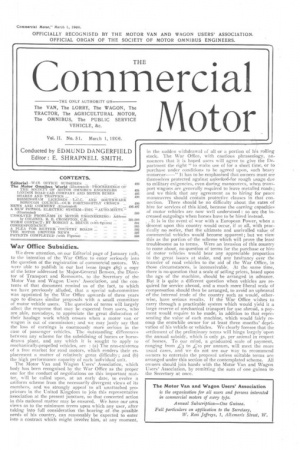War Office Subsidies.
Page 1

If you've noticed an error in this article please click here to report it so we can fix it.
We drew attention, on our Editorial page of January itth, to the intention of the War Office to enter seriously into the question of the registration of commercial motors. We were able to publish in our last issue (page 485) a copy of the letter addressed by Major-General Benson, the Director of Transport and kemounts, to the Secretary of the Motor Van and Wagon Users' Association, and the contents of that document remind us of the fact, to which we have previously alluded, that a special sub-committee was appointed by the War Office upwards of three years ago to discuss similar proposals with a small committee of motor vehicle users. The question of terms will largely affect the response that may be expected from users, who are able, nowadays, to appreciate the great dislocation of their haulage work which ensues when a motor van or wagon is out of commission ; and we may justly say that the loss of earnings is enormously more serious in the case of passenger vehicles. The outstanding differences between any scheme for the subsidising of horses or horsedrawn plant, and any which it is sought to apply to mechanically-propelled vehicles, are : (a) The non-existence of a free market for road motors, which renders their replacement a matter of relatively great difficulty; and (b) the high performance capacity of each individual unit.
The Motor Van and Wagon Users' Association, which body has been recognised by the War Office as the proper one for the conduct of negotiations on this important matter, will be called upon, at an early date, to evolve a uniform scheme from the necessarily divergent views of its members, and we strongly appeal to all unattached proprietors in the United Kingdom to join this representative association at the present juncture, so that concerted action in this national matter may be ensured. We have our own views as to the minimum terms upon which any user, after taking into full consideration the bearing of the. possible needs of his country, can reasonably be expected to enter into a contract which might involve him, at any moment, in the sudden withdrawal of all or a portion of his rolling stock. The War Office, with cautious phraseology, announces that it is hoped users will agree to give the Department the right "to make use of for a short time, or to purchase under conditions to be agreed upon, such heavy motorcar—" It has to be emphasised that owners must see themselves protected against unlooked-for rough usage due to military exigencies, even during manceuvres, when transport wagons are generally required to leave metalled roads; and we think that any agreement as to hiring for peace manceuvres should contain protective clauses in that connection. There should be no difficulty about the rates of hire for services of this kind, because the earning capacities of motor vehicles are now well understood : so are the increased outgoings when horses have to be hired instead.
•
it is in the event of war with a European Power, when a descent upon this country would occur, if at all, with practically no notice, that the ultimate and unrivalled value of commercial vehicles would become apparent; but we view this as the portion of the scheme which will prove the least troublesome as to terms. Were an invasion of this country to come about, no question of terms for the purchase or hire of motor vehicles would bear any appreciable proportion to the great issues at stake, and any hesitancy over the transfer of road vehicles to the aid of the War Office, in those circumstances, is inconceivable. At the same time, there is no question that a scale of selling prices, based upon the age of the machine, should be arranged in advance. But it is quite a different question when vehicles are required for service abroad, and a much more liberal scale of compensation should then be arranged, to avoid an upheaval of the internal trade of the country such as would, otherwise, have serious results. If the War Office wishes to carry through a practicable system which would yield it a large reserve of mechanical transport for use abroad, a payment would require to be made, in addition to that representing the value of each machine, which would fairly recoup the erstwhile owner for at least three months' deprivation of his vehicle or vehicles. We clearly foresee that the settlement of the preliminary terms will hinge largely upon the annual subsidy, which is only 5s. per animal in respect of horses. To our mind, a graduated scale of payment, ranging from 4.3 to 4:io per annum, will meet the more usual cases, and we do not see our way to recommend owners to entertain the proposal unless suitable terms are arranged under this section of the contemplated scheme. All owners should join hands with the Motor Van and Wagon Users' Association, by remitting the sum of one guinea to the Secretary at once.
















